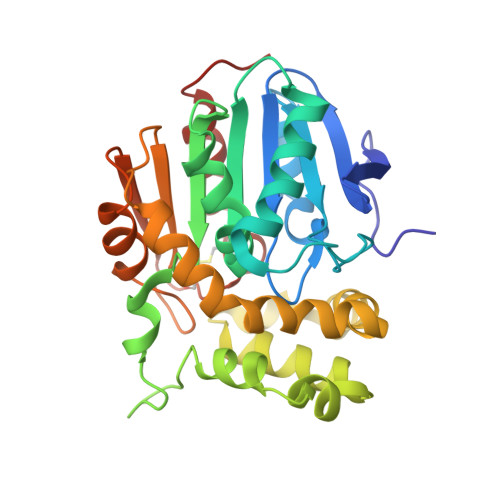Pseudomonas aeruginosa sabotages the generation of host proresolving lipid mediators.
Flitter, B.A., Hvorecny, K.L., Ono, E., Eddens, T., Yang, J., Kwak, D.H., Bahl, C.D., Hampton, T.H., Morisseau, C., Hammock, B.D., Liu, X., Lee, J.S., Kolls, J.K., Levy, B.D., Madden, D.R., Bomberger, J.M.(2017) Proc Natl Acad Sci U S A 114: 136-141
- PubMed: 27980032
- DOI: https://doi.org/10.1073/pnas.1610242114
- Primary Citation of Related Structures:
5JYC - PubMed Abstract:
Recurrent Pseudomonas aeruginosa infections coupled with robust, damaging neutrophilic inflammation characterize the chronic lung disease cystic fibrosis (CF). The proresolving lipid mediator, 15-epi lipoxin A 4 (15-epi LXA 4 ), plays a critical role in limiting neutrophil activation and tissue inflammation, thus promoting the return to tissue homeostasis. Here, we show that a secreted P. aeruginosa epoxide hydrolase, cystic fibrosis transmembrane conductance regulator inhibitory factor (Cif), can disrupt 15-epi LXA 4 transcellular biosynthesis and function. In the airway, 15-epi LXA 4 production is stimulated by the epithelial-derived eicosanoid 14,15-epoxyeicosatrienoic acid (14,15-EET). Cif sabotages the production of 15-epi LXA 4 by rapidly hydrolyzing 14,15-EET into its cognate diol, eliminating a proresolving signal that potently suppresses IL-8-driven neutrophil transepithelial migration in vitro. Retrospective analyses of samples from patients with CF supported the translational relevance of these preclinical findings. Elevated levels of Cif in bronchoalveolar lavage fluid were correlated with lower levels of 15-epi LXA 4 , increased IL-8 concentrations, and impaired lung function. Together, these findings provide structural, biochemical, and immunological evidence that the bacterial epoxide hydrolase Cif disrupts resolution pathways during bacterial lung infections. The data also suggest that Cif contributes to sustained pulmonary inflammation and associated loss of lung function in patients with CF.
- Department of Microbiology and Molecular Genetics, University of Pittsburgh School of Medicine, Pittsburgh, PA 15219.
Organizational Affiliation:

















